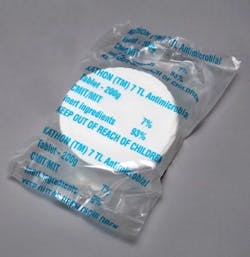Disinfection: Safe & Sustainable
About the author: Christine McInnis is global R&D water platform leader for Dow Microbial Control, a business unit of the Dow Chemical Co. McInnis can be reached at 610.244.6744.
While powders and liquids are traditional treatment methods for biofilm, bacteria, algae and fungi in small- to medium-sized closed-loop water systems, many facility service managers are turning to safer, more convenient tablets. Tablet antimicrobial treatment can help improve system performance and help facilities save money on gas and electric costs and decrease the downtime typically required to treat systems, while also providing safety from spills and skin contact risks associated with liquid treatments, and from dust associated with powder treatments.
With increasing emphasis on reducing water use, cooling water systems have become more efficient and require smaller volumes of water for operation. A new solid tablet antimicrobial technology that is designed for small- to medium-sized cooling towers is the Kathon 7 TL solid biocide from the Dow Chemical Co.
Recently approved by the U.S. Environmental Protection Agency, the tablet is made with the active ingredients chloromethylisothiazolone and methylisothiazolone (CMIT/MIT) and has seen initial success in nursing home, hospital, hotel and school cooling water systems, helping facilitate easy-to-use and reliable microbial control. The fast dissolution of the tablet also provides a convenient option for slug dosing.
Microbial Control in Action
APTech Group Inc., a global manufacturer of blended solid concentrate water treatment products based in the U.S., has experienced success with these antimicrobial tablets in treating a large university closed-loop heating system in the U.K. The water first is cleaned with filters to remove debris, then is treated with the tablets to clear bacteria. Treating the system with the tablets can help extend the longevity of the heating infrastructure by minimizing risk of corrosion.
The tablets also have improved safety for facility managers and those working to treat the system. The hockey puck-sized tablets eliminate the risk of liquid spills or leaks that can splash onto a person, and reduce dust from powder that can come into contact with skin. Reduced risk of exposure and easy handling are provided by a protective, water-soluble wrapper. A fully dissolvable tablet and wrapper system, the treatment technology leaves no residue or retrievable material. The tablet itself eliminates the need for solvents, heavy metals, and pail or drum disposal. The inherently biodegradable formulation contains no heavy metals or added formaldehyde.
While a liquid antimicrobial product is typically 1.5% active, the tablets are 7% active. Formulating more active ingredients into the tablet enables lower volumes of material to be shipped for the same amount of water to be treated, lowering shipping costs and using less fuel for transportation, thereby contributing to a more sustainable operation for all involved in the distribution of the product. Another benefit is the ability to fit a pail of tablets easily into smaller vehicles, as opposed to transporting drums of liquid chemicals, allowing for easier on-the-spot system troubleshooting.
APTech Group also has reported that the antimicrobial tablets have been successful in removing and treating Pseudomonas aeruginosa—bacteria found in water and most man-made environments that can cause disease in animals, including humans—in commercial buildings in the U.K.
In addition to minimizing the potential for accidents with students, residents and employees of the facility, facility managers in the U.K. using CMIT/MIT tablets are benefitting from the decrease in large vats of chemicals carted through lobbies, hallways and other common areas. Tablets are providing increased onsite safety by eradicating the need to dispose of empty liquid supply drums and improving logistics, because more product can be safely stored in onsite storage closets.
Addressing Industry & Consumer Concerns
Due to concerns over the threat of Legionella, ASHRAE recently published ANSI/ASHRAE Standard 188-2015, Legionellosis: Risk Management for Building Water Systems, which provides guidelines for reducing the risk of legionellosis associated with building water systems. The approved standard requires building owners to have and practice a program for cooling towers or evaporative condensers, whirlpool spas, ornamental fountains, misters, atomizers, air washers, humidifiers and other devices that release water droplets.
The Kathon 7 TL antimicrobial tablets can reduce the amount of biofilm in a system that supports bacterial growth. The tablets also are effective against sulfate-reducing bacteria such as Desulfovibrio strains, while also controlling complex microbial biofilms. In regions of the world where CMIT/MIT is approved for Legionella control, the tablets are a viable option to consider. They control microbial metabolism within five minutes and kill microbes within 24 hours.
Easy Application
The antimicrobial tablets can be applied to systems in a variety of ways for easy dosing. The tablets can be added to a plastic mesh bag and suspended in the flowing area of a sump or placed in side-stream or floating feeders. The tablets are compatible with water treatment additives and have low corrosion potential for metal and concrete.
For easy monitoring, a field test kit can measure active levels in industrial cooling waters. The colorimetric test kit causes a reaction with the active molecule to produce a blue color, which then can be compared with a chart to determine the concentration of active molecules in the water sample.
Setting an Enhanced Industry Standard
Antimicrobial tablets are providing service companies with a safer-handling, non-retrievable solid form of CMIT/MIT, helping to improve facility sustainability and increase cost savings while decreasing system downtime. These tablets are addressing industry challenges by broadening the spectrum of microbial control solutions for the industry.
Download: Here
